Related Research Articles
Politics of India works within the framework of the country's Constitution. India is a parliamentary democratic republic in which the President of India is the head of state and the Prime Minister of India is the head of government. It is based on the federal structure of government, although the word is not used in the Constitution itself. India follows the dual polity system, i.e. federal in nature, that consists of the central authority at the centre and states at the periphery. The Constitution defines the organisational powers and limitations of both central and state governments; it is well recognised, fluid and considered supreme, i.e. the laws of the nation must conform to it.
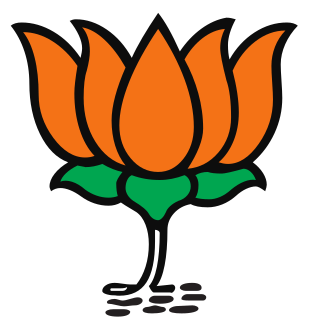
The Bharatiya Janata Party is one of two major political parties in India, along with the Indian National Congress. It is the current ruling political party of the Republic of India, since 2014. The BJP is a right-wing party, and its policy has historically reflected Hindu nationalist positions. It has close ideological and organisational links to the much older Rashtriya Swayamsevak Sangh (RSS). As of 2020, it is the country's largest political party in terms of representation in the national parliament and state assemblies and is by far the world's largest party in terms of primary membership, with the second largest party, the Communist Party of China, having about half the registered members of the BJP.
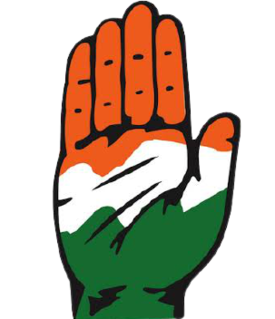
The Indian National Congress is a political party in India with widespread roots. Founded in 1885, it was the first modern nationalist movement to emerge in the British Empire in Asia and Africa. From the late 19th century, and especially after 1920, under the leadership of Mahatma Gandhi, Congress became the principal leader of the Indian independence movement. Congress led India to independence from the United Kingdom, and powerfully influenced other anti-colonial nationalist movements in the British Empire.
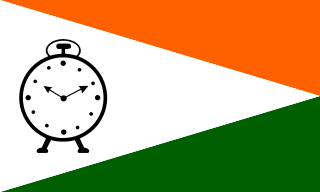
The Nationalist Congress Party is one of the eight national parties in India.

The Communist Party of India (Marxist) is a communist political party in India. It is one of the national parties of India. The party emerged from a split from the Communist Party of India in 1964. The CPI(M) was formed in Calcutta from 31 October to 7 November 1964.

The Communist Party of India is the oldest communist political party in India, one of the eight national parties in the country. The CPI was formed on 26 December 1925 at Kanpur.

The Bahujan Samaj Party (BSP) is a national level political party in India that was formed to represent Bahujans, referring to Scheduled Castes, Scheduled Tribes, and Other Backward Classes (OBC), along with religious minorities. According to Kanshi Ram, when he founded the party in 1984, the Bahujans comprised 85 percent of India's population, but were divided into 6,000 different castes. The party claims to be inspired by the philosophy of Gautama Buddha, B. R. Ambedkar, Mahatma Jyotiba Phule, Narayana Guru, Periyar E. V. Ramasamy and Chhatrapati Shahuji Maharaj. Kanshi Ram named his protégée, Mayawati, as his successor in 2001. The BSP has its main base in the Indian state of Uttar Pradesh where it was the second-largest party in the 2019 Indian general election with 19.3% of votes and in the 2017 Uttar Pradesh elections with over 22% of votes. Its election symbol is an elephant.

Samajwadi Party is a political party in India, headquartered in New Delhi. Although it contests elections in several states, its main base is in Uttar Pradesh, where it is currently the Opposition in the Legislative Assembly. It currently holds 5 seats in the Lok Sabha.

National Democratic Alliance (NDA) is an Indian big tent political alliance led by the right-wing Bharatiya Janata Party (BJP). It was founded in 1998 and currently controls the government of India as well as the government of 18 Indian states.
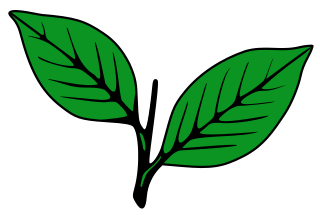
The All India Anna Dravida Munnetra Kazhagam is an Indian regional political party which has a major influence in the state of Tamil Nadu and union territory of Puducherry. It is currently the main opposition party in Tamil Nadu Legislative Assembly and part of the National Democratic Alliance. AIADMK is a Dravidian party founded by M. G. Ramachandran (M.G.R.) at Madurai on 17 October 1972 as a breakaway faction from the Dravida Munnetra Kazhagam after M. Karunanidhi expelled him from the party for asking for accounts as party treasurer. The party is adhering to the socio-democratic and social justice principles based of C. N. Annadurai collectively coined as Annaism by M.G.R.

Dravida Munnetra Kazhagam is a political party from India, which has a major influence on the state of Tamil Nadu and the union territory of Puducherry. It is currently the ruling party of Tamil Nadu and is a part of the Indian political front known as the United Progressive Alliance (UPA). DMK is a Dravidian party, adhering to the socio-democratic and social justice principles based on C. N. Annadurai and Periyar E. V. Ramasamy. It was founded in 1949 by Annadurai as a breakaway faction from the Dravidar Kazhagam, which was headed by Periyar E. V. Ramasamy.

The Janata Party was a political party that was founded as an amalgam of Indian political parties opposed to the Emergency that was imposed between 1975 to 1977 by Prime Minister Indira Gandhi of the Indian National Congress. In the 1977 general election, the party defeated the Congress and Janata leader Morarji Desai became the first non-Congress prime minister in independent modern India's history.

The All India Trinamool Congress is an Indian political party which is predominantly active in West Bengal. The party is led by Chief Minister of West Bengal Mamata Banerjee, who has led the state since 2011. Following the 2019 general election, it is currently the fourth-largest party in the Lok Sabha with 22 seats.
India has a parliamentary system as defined by its constitution, with power distributed between the central government and the states.
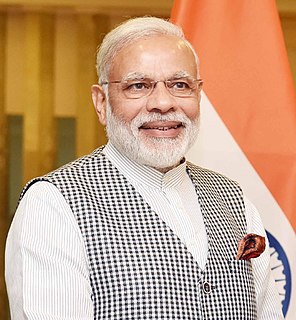
General elections were held in India in nine phases from 7 April to 12 May 2014 to elect the members of the 16th Lok Sabha. With 834 million registered voters, they were the largest-ever elections in the world until being surpassed by the 2019 elections. Around 23.1 million or 2.7% of the total eligible voters were aged 18–19 years. A total of 8,251 candidates contested the 543 elected Lok Sabha seats. The average election turnout over all nine phases was around 66.40%, the highest ever in the history of Indian general elections.

The Yuvajana Sramika Rythu Congress Party is an Indian regional political party based in the state of Andhra Pradesh. Its founder and president Y. S. Jagan Mohan Reddy serves as the state's chief minister. Since the 2019 general election, the YSRCP has been the joint-fourth largest party in the Lok Sabha with 22 seats.

Aam Aadmi Party is a political party in India, founded in 2012. It styles itself as an alternative to the mainstream Bharatiya Janata Party (BJP) and Indian National Congress. It currently runs the state government in Delhi, having held a majority in the Delhi Legislative Assembly since the 2015 election, limiting BJP to a few seats and pushing Congress out entirely. It retained its supermajority in the 2020 elections.

General elections were held in India in seven phases from 11 April to 19 May 2019 to elect the members of the 17th Lok Sabha. Votes were counted and the result declared on 23 May. Around 912 million people were eligible to vote, and voter turnout was over 67 percent – the highest ever, as well as the highest ever participation by women voters.

The Election Commission of India (ECI) is a permanent and independent body established by the Constitution of India directly to ensure free and fair elections in the country. Article 324 of the Constitution provides that the power of superintendence, direction, and control of elections to parliament, state legislatures, the office of the president of India, and the office of vice-president of India shall be vested in the election commission. Thus, the Election Commission is an all-India body in the sense that it is common to both the Central government and the state governments.
References
- ↑ "Statistical Reports of Lok Sabha Elections" (PDF). Election Commission of India. Retrieved 17 September 2011.